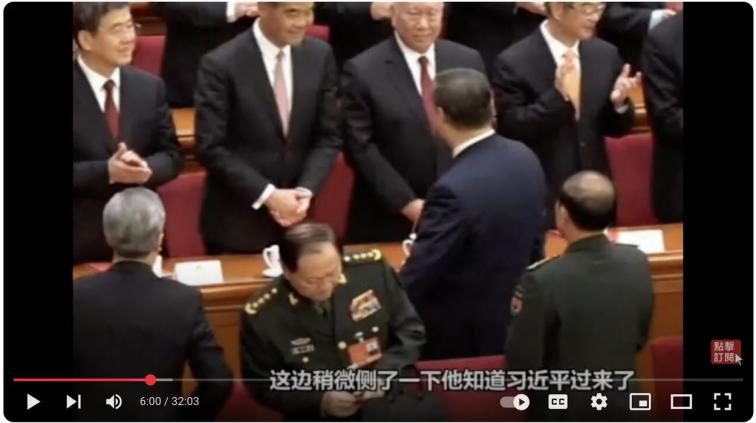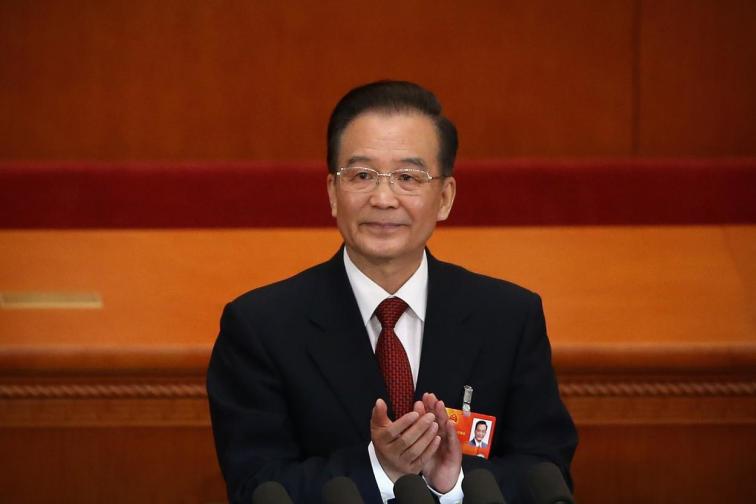Image: During the March 2024 Two Sessions, Xi Jinping was photographed by foreign media in the Great Hall of the People with an expression of extreme pain while drinking tea.(Illustration by Qing Yu/People News)
[People News] Although Xi Jinping still appears to hold power, there are rampant rumours regarding his loss of authority and health crises. It is said that he has been unable to understand why he has descended into such a dire situation while lying in his sickbed. Many believe that his loss of power is primarily due to serious health issues rather than a governance crisis stemming from unpopular policies. Recently, a blog post contended that this perspective is misguided. The accurate causal relationship is that Xi Jinping's policies have faced resistance from all levels, leading to frequent outbursts of anger, compounded by his concentration of power and involvement in all affairs, which ultimately resulted in health problems. Furthermore, a columnist has disclosed the shocking truth behind Xi Jinping's deadlock in both domestic and foreign policies.
A blog post authored by Chen Jialiangzi was published on June 13, coinciding with the growing rumours about Xi Jinping's diminishing power. The article asserts that there is indeed a basis for the claim that Xi Jinping's influence is waning, and it is not simply fabricated nonsense circulating online. Chen Jialiangzi observes that the shift in the Communist Party's policies and the purging or marginalisation of many of Xi Jinping's close allies are events that can be traced. The pressing question now is when and how he will make his exit.
Regarding the reasons for Xi Jinping's loss of power, Chen Jialiangzi believes it stems from his unpopular policies. He has not only lost the support of the general public but also the widespread backing within the Communist Party. There is a general dissatisfaction with his policies both inside and outside the party, with resistance manifesting both overtly and covertly; it is not due to any significant health issues he may be experiencing.
Recently, there were online rumours suggesting that Xi Jinping experienced a sudden illness during last year's Third Plenary Session, which has led some to believe that his loss of power was due to health issues, providing an opportunity for the anti-Xi faction. The underlying implication is that if Xi Jinping were in good health, he would not have lost power. Chen Jialiangzi argues that this interpretation actually reverses the causal relationship.
An internal briefing submitted to the Kremlin by the Russian Foreign Intelligence Service on June 9 revealed that Xi Jinping suffered a heart attack on the night of May 25 to 26, and experienced two additional health incidents in the first week of June. Doctors assessed that if Xi Jinping continued to attend meetings, the consequences could be severe, potentially leading to an incident on-site. The briefing also indicated that a consensus had been reached among some high-ranking officials within the Communist Party regarding Xi Jinping's removal, while his close associates were actively obstructing this, which has raised significant concern in the Kremlin. Putin has ordered close monitoring of the situation in Beijing.
In his article, Chen Jialiangzi describes how the bureaucratic system of the Communist Party presents a facade of loyalty to Xi Jinping while being disloyal behind his back, sometimes displaying 'high-level black' or 'low-level red' behaviour. Xi Jinping has sensed the widespread dissatisfaction among the populace, which has made him quite angry. Whenever he sees particularly displeasing news reports, he becomes furious and enraged. Furthermore, given Xi Jinping's advanced age, he continues to take on all matters of party, government, and military affairs in great detail, resulting in an excessively high workload. Physically, he is already quite fatigued, and combined with immense mental pressure, it is surprising that he has not fallen ill.
The article discusses that even though Xi Jinping fell ill during last year's Third Plenary Session and was temporarily unable to govern, this was a consequence of his failures in internal party struggles, not the cause of his loss of power. Conversely, if Xi's health continues to decline, making it difficult for him to manage the heavy workload he once handled, it will further worsen his grip on power.
Chen Jialiangzi argues that the rule of the Chinese Communist Party (CCP) is bound by historical cycles; a transition to constitutional governance is unlikely. Xi Jinping's policy reversals will only hasten the erosion of the CCP's authority, rather than prolong it as he hopes.
Reports suggest that even while bedridden, Xi Jinping has struggled to comprehend why he has become so widely criticized and abandoned. Chen Jialiangzi's article concludes that Xi is disconnected from the current era and unaware of prevailing trends, which will inevitably lead to his downfall.
Why have Xi Jinping's domestic and foreign policies hit a dead end?
Wang Youqun, a former official of the Central Commission for Discipline Inspection of the CCP now in exile in the United States and a columnist for The Epoch Times, recently analyzed why Xi Jinping's domestic and foreign policies have reached a stalemate.
The article notes that by 2025, Xi Jinping will have been in power for 13 years. From the establishment of the Xiong'an New Area in the
Since April of last year, Xi Jinping's military confidants have been reassigned or investigated one after another, leading observers to conclude that Xi has lost military power. With this loss, his departure from office may not be far off.
Wang Youqun has revealed a shocking fact that has emerged during Xi Jinping's 13 years in power.
This year marks the 26th year of the Chinese Communist Party's ongoing persecution of Falun Gong, with the persecution continuing for 13 years since Xi took office.
Falun Gong is a Buddhist practice based on the fundamental principles of the universe: 'Truth, Compassion, Forbearance.' In 1999, Jiang Zemin mobilised the entire state apparatus, utilising the nation's human, material, and financial resources, and employing the most nefarious tactics throughout history, yet he could not eradicate Falun Gong. To this day, Falun Gong not only remains resilient but has also spread to over 110 countries and regions worldwide.
Since Xi came to power, the persecution policy against Falun Gong has persisted.
According to data from Minghui.org, Wang Youqun has conducted a preliminary statistical analysis of the persecution of Falun Gong from January 2013 to April 2025, covering Xi's 13 years in power. During this period, there were a total of 130,698 instances of kidnapping or harassment, 11,200 illegal sentences, and 1,368 deaths due to persecution.
Wang Youqun (王有群) noted that Xi (习) is not the one responsible for the persecution of Falun Gong or the live organ harvesting of its practitioners. When explaining the truth to Xi, Wang makes an effort to differentiate him from Jiang Zemin (江泽民), the main architect of the persecution, hoping that Xi will not become a scapegoat for Jiang after understanding the truth and will choose to do good. However, Xi not only refuses to listen to the truth and reject good counsel, but he also personally 'deploys and commands' the escalation of the persecution of Falun Gong abroad.
On December 6, 2024, The Epoch Times published a report titled 'Xi Personally Determines New Strategy to Attack Falun Gong Before the 20th National Congress.' The report highlighted that Yuan Hongbing (袁红冰), a legal scholar in Australia with ties to individuals within the Chinese Communist Party (CCP), disclosed that prior to the 20th National Congress of the CCP in 2020, Xi personally orchestrated attacks on Falun Gong overseas. This operation was coordinated by the Central Political and Legal Affairs Commission, primarily led by the Ministry of State Security, with support from the Ministry of Foreign Affairs, the United Front Work Department, and other relevant agencies, initiating legal and public opinion campaigns against Falun Gong abroad.
Wang Youqun pointed out that before Xi took office, the CCP had already been persecuting Falun Gong for 13 years; after Xi assumed power, the persecution continued for another 13 years. This accounts for 26 years of the CCP's widespread promotion of 'falsehood, evil, and struggle' both in China and globally. Wang believes this is the fundamental reason why Xi's domestic and foreign policies have reached a dead end.
What has led Xi to this point? Wang Youqun emphasized that a crucial reason is that Xi has never grasped why Jiang Zemin and the CCP oppose 'Truth, Compassion, and Forbearance.' He explained that Marxism, regardless of how noble it may appear on the surface, is fundamentally at odds with 'Truth, Compassion, and Forbearance,' embodying 'falsehood, evil, and struggle.'
(Originally published by People News)










News magazine bootstrap themes!
I like this themes, fast loading and look profesional
Thank you Carlos!
You're welcome!
Please support me with give positive rating!
Yes Sure!